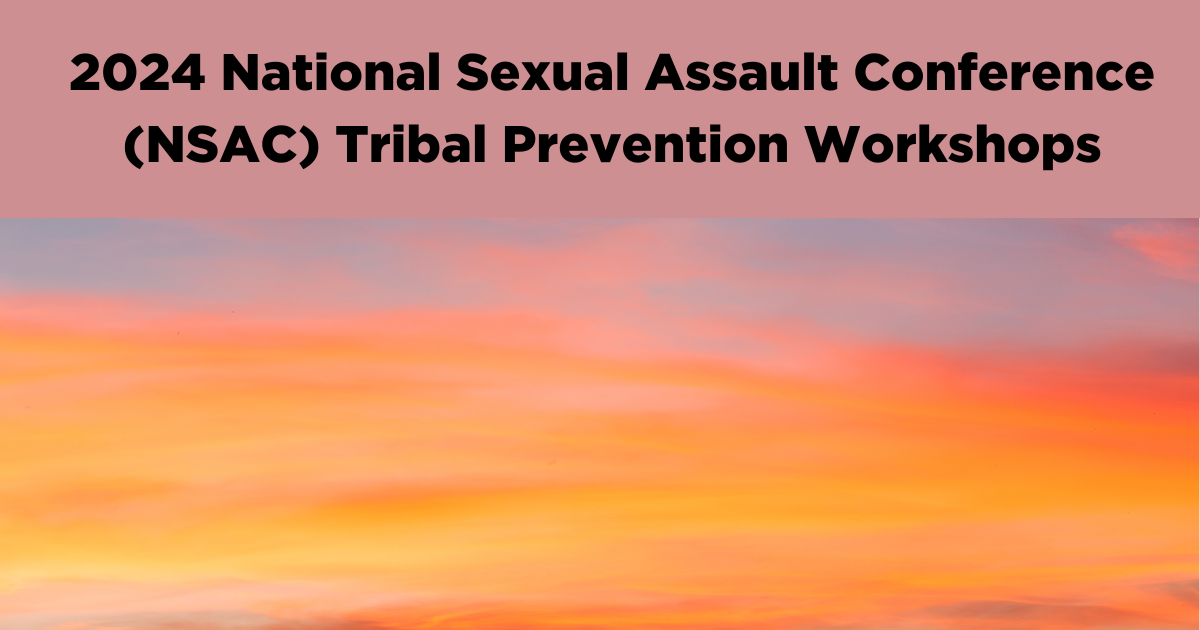
Ingrid Anderson, MPA – National Policy Director
Morgan Hawes, MPP BSW – National Tribal Sex Trafficking Technical Assistance & Training Program Coordinator
Minnesota Indian Women’s Sexual Assault Coalition
A key element of prevention work is acknowledging the role of individual healing, in healing a community. Given that community holds the stories of survivors; how can we develop policies that reflect the stories and truths that we all hold? This recorded workshop discusses the policies that impact the work we are doing in service to our relatives and communities. It also discusses gathering data and exercising data sovereignty to support and sustain healing communities, restorative paths to healing through developing community-informed policy, and tools to leverage our own stories and experiences to dismantle current policies that no longer serve us.
Stephanie Bridwell & Debra Bush, TSASP National TTA Team
Minnesota Indian Women’s Sexual Assault Coalition
Working to end sexual violence can be a very rewarding role but the demands and emotional toll can quickly lead to burn out. This session will provide insight on how tribal program staff deal with the increased prevalence of sexual violence, multiple jurisdictional barriers, limited access to services and how that is connected to higher rates of burn-out and staff turnover. We will discuss ways to prevent burnout and how to maintain a balanced lifestyle while working with survivors.
Nicole Matthews, Executive Director
Minnesota Indian Women’s Sexual Assault Coalition
Collective action and organizing is not a new concept in tribal communities…. Our people have been organizing for many years. This recorded workshop session shares successes, lessons, and organizing strategies about using collective action to end sexual violence.
Daniel Goombi, Executive Director
Midwest Native Coalition for Justice and Peace
This recorded workshop session discusses community organizing efforts that are both proactive and reactive when addressing violence and trauma within Tribal communities and reimagines the use of comprehensive responses to broaden the impact of advocacy efforts that go beyond the pre and post of survivorship. Strength through experiences was drawn from the participants gathered to identify unique needs and challenges in serving tribal communities, support the development of creative organizing approaches, and leave ready to act on supporting impactful, comprehensive responses.
Nicole Michelena, Training and Education Coordinator
Patrick Gallegos, Sex Trafficking Project Coordinator
Coalition to Stop Violence Against Native Women
This recorded workshop session discusses safe, affordable, and sustainable housing options as a path to protecting our communities and preventing chronic and acute sexual assault. By developing permanent housing initiatives that center community members and survivors, we can work towards quantifiable solutions to sexual violence prevention.
Keely C Linton, Executive Director
Strong Hearted Native Women’s Coalition
This recorded workshop addresses the barriers and safety concerns tribal victims come across. Some communities and agencies still reinforce harmful stereotypes and are not given the opportunity to “decolonize” and “unlearn” critical pieces of what adds to systemic racism which creates barriers and limited access to services. This mindset is also reinforced by laws and policies. The discussion covers myths & stereotypes, sovereignty and autonomy, culture as healing, and resources. Practices and ways your agency or community can be good relatives are included.
Shayla Beaumont, Elevate|Uplift Coordinator
Morgan Hawes, MPP BSW – National Tribal Sex Trafficking Technical Assistance & Training Program Coordinator
Minnesota Indian Women’s Sexual Assault Coalition
Silence is the absence of words, not meaning. This recorded workshop session focuses on the power of silence in our communities and the intersection between generational trauma and sexual violence. Youth learn from a young age to believe silence is ‘normal”. Survivors carry the responsibility of their experiences, shrouded in blame and shame. The power of voice comes from acknowledging that talk is culture, talk is a way to heal. If no one is talking about the “thing”, nothing will change. There can be no accountability. We must reconnect to how we share and pass along knowledge, wisdom, and our experiences in order to disrupt the patterns of violence that exist within our communities. When we make room for talk, we are prioritizing prevention, we are supporting and teaching the next seven generations, and we take the power from harm-doers and give it back to survivors. This recorded workshop session explores the importance of developing strategies to engage communities in practicing “talk” as a way to build awareness, reconnect with our indigenous values, and support prevention.
